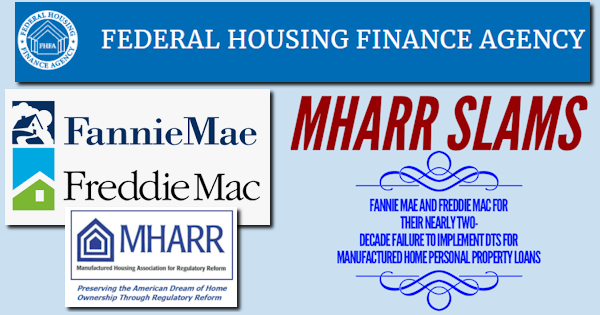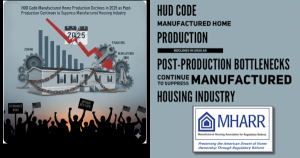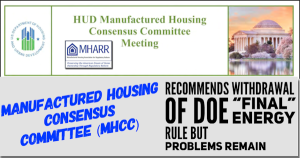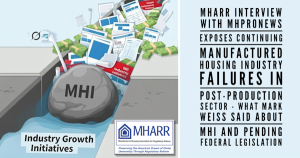MHARR Slams Fannie Mae and Freddie Mac for Their Nearly Two- Decade Failure to Implement DTS for Manufactured Home Personal Property Loans

My name is Mark Weiss
I am the President and CEO of the Manufactured Housing Association for Regulatory Reform (MHARR), based in Washington, D.C.
Our organization represents the views and interests of independent producers of federally-regulated manufactured housing.
MHARR was an original and active proponent of the Duty to Serve mandate with respect to the manufactured housing market.
As such, we have called consistently for the full and robust implementation of DTS within the manufactured housing sector.
Yet today, some 16 years after the enactment of the DTS directive – and continuing for another three years if the current 2025-2027 proposed plans are approved – the Enterprises have and will provide absolutely no secondary market or securitization support for the vast bulk of the manufactured housing consumer finance market represented by personal property loans.
This ongoing failure is totally inconsistent with the purposes and express terms of DTS, and is unacceptable.
At a time when housing affordability in the United States is at an all-time low, according to published reports and the nation desperately needs millions more affordable homes, including affordable “starter” homes, according to economic analyses published by the Enterprises themselves, it is unconscionable that the Enterprises (and FHFA) – in the face of a specific congressional directive – would fail to serve, at all, the most affordable sector of the nation’s most affordable type of homeownership.
According to the latest available U.S. Census Bureau data (2022), the average sales price of a mainstream HUD Code manufactured home is $127,300. That is 23% of the average sales price of a site-built home including land ($540,000) and 29% of the average sales price of a site-built home without land ($430,808).
Furthermore, as I have noted in multiple past listening sessions and in multiple rounds of written DTS comments to FHFA, the vast bulk of the mainstream manufactured home market is financed through personal property or “chattel” loans. Again, according to Census Bureau data, the proportion of manufactured home purchases titled and financed as personal property – since 2014 – has varied within a narrow range from 73 to 80%.
According to the latest available (2022) data, the proportion of personal property homes is 73% — still nearly three-quarters of the entire manufactured housing market.
And, because such homes are not financed together with land – most often being placed within land-lease communities or on otherwise unencumbered property – their cost to purchasers is significantly lower, not only than comparably-sized site-built homes, but also the more costly real estate-titled manufactured homes that the Enterprises have catered-to under DTS.
For example, FHFA and the Enterprises recently made much of their support for a new manufactured housing development in Maryland.
While such support is welcome, information from the developer’s own website shows that real estate-titled homes in that community are being offered for sale with prices ranging from a low of $306,967, or 240% of the average sales price of a new mainstream manufactured home sold as personal property, to a high of $375,678, or nearly 300% of the average sales price of a new mainstream manufactured home sold as personal property.
What should be evident is that these homes — of a type strongly favored by the Enterprises (and FHFA) for support under DTS — are more comparable in cost to an average site-built home than a mainstream HUD Code manufactured home financed as personal property. Consequently, while they are more affordable than site-built homes generally, they are not as affordable as mainstream HUD Code manufactured homes financed as personal property.
Consequently, the current DTS policy of the Enterprises (and FHFA) leaves the most affordable segment of the manufactured housing market and the single largest segment of the HUD Code market – financed with personal property consumer loans – totally unserved, in direct violation of the DTS mandate, which specifically includes personal property loans within its scope.
Moreover, the impact of this failure on both the industry and lower and moderate-income consumers has been very damaging.
It is undisputed that interest rates on manufactured home personal property loans are higher than those for real estate loans, but that those higher rates are attributable, in part, to the higher risk retained by the portfolio lenders that provide such consumer financing.
Conversely, it is also undisputed that secondary market and securitization support for such loans by the Enterprises under DTS – if it existed — would result in a lower retained risk, lower rates and a corresponding reduction of the cost burdens borne by purchasers, which would lead to higher production and sales levels.
The validity of this connection between financing cost and production levels is illustrated by the performance of the manufactured housing market from the fourth quarter of 2022 through the entirety of 2023.
After 100,000+ homes were produced in both 2021 and 2022, manufactured home production began a precipitous decline in the fourth quarter of 2022, after the Federal Reserve began a series of interest rate increases in mid-2022. With interest rate increases continuing through July 2023, the HUD Code market – which is extremely price sensitive – continued to decline, concluding 2023 with only 89,169 homes produced, a 21% percent annual decline.
If higher interest rates across the manufactured housing market can produce nearly one-quarter production declines – and they did leading into and through 2023 – then lower interest rates resulting from the market-significant implementation of DTS across the manufactured housing consumer financing spectrum would similarly spur production and the greater utilization of mainstream HUD Code manufactured housing as a cure to the nation’s shortage of affordable homes.
Yet, both Enterprises continue to snub DTS, snub Congress and snub American consumers of affordable housing by outright refusing to include manufactured housing personal property loans within their implementation of DTS. This needlessly drives consumers into higher-than-necessary (and arguably predatory) interest rate loans to purchase new manufactured homes.
This failure is inexcusable. DTS is clear and unambiguous in its inclusion of manufactured housing personal property loans. That duty must be carried out to its full extent as any contrary interpretation would receive no deference in court — something that FHFA would be wise to contemplate.
The failure of the 2025-2027 DTS proposed plans to include any support for manufactured housing personal property loans is a major failing, which must be corrected and remedied. MHARR and its members have already provided significant data to FHFA. What would it have the industry (and consumers) do to finally move this matter forward to the accomplishment of DTS’ full goals and objectives as intended and designed by Congress?
Thank you.
MHARR SLAMS FANNIE MAE AND FREDDIE MAC FOR THEIR NEARLY TWO –DECADE FAILURE TO IMPLEMENT DTS FOR MH PERSONAL PROPERTY LOANS
Washington, D.C., July 17, 2024 – The Manufactured Housing Association for Regulatory Reform (MHARR), in comments presented to a July 16, 2024 Federal Housing Finance Agency (FHFA) “listening session” concerning proposed 2025-2027 Duty to Serve Underserved markets (DTS) implementation plans submitted for FHFA approval by Fannie Mae and Freddie Mac (copy attached), has slammed those plans for once again failing to offer or provide any support whatsoever for manufactured housing personal property consumer loans.
Although the DTS mandate expressly includes manufactured homes financed as personal property, the Government Sponsored Enterprises, Fannie Mae and Freddie Mac – with the approval of their federal regulator, FHFA — have excluded such loans from their DTS implementation plans continuously since the enactment of DTS, nearly two decades ago, as part of the Housing and Economic Development Act of 2008 (HERA). That total exclusion would be extended under the Enterprises’ proposed 2025-2027 DTS plans, even though the vast bulk of new manufactured homes (73%) continue to be financed via such consumer loans. Effectively then, notwithstanding the express directive of DTS, Fannie Mae and Freddie Mac have – and continue to – leave three-quarters or more of the manufactured housing market and millions of American consumers of affordable housing, completely unserved.
As MHARR has maintained consistently, at previous DTS listening sessions, in written DTS comments to FHFA, and in face-to-face meetings with FHFA Director, Sandra Thompson, the Enterprises’ failure to provide any level of DTS support whatsoever, to the single largest segment of the manufactured housing consumer financing market (as represented by manufactured housing personal property loans) is a clear violation of DTS that cannot be explained, excused, rationalized, or justified in any manner.
Further, as MHARR made clear in its comments, this brazen defiance of DTS, as an express directive of Congress and unambiguous expression of congressional intent, directly harms manufactured housing consumers (and especially lower and moderate-income families). It harms them on one level by forcing them to pay higher-than-necessary (and in some instances arguably “predatory”) interest rates to dominant lenders within a less-than-fully-competitive market for manufactured home purchase loans (and personal property loans in particular), due to denial of the risk mitigation benefits of DTS securitization and secondary market support. Meanwhile, it harms other consumers (and especially those at marginal income levels) even more egregiously by excluding them altogether from the manufactured housing market due to higher than necessary financing costs.
All the while, MHARR noted, Fannie and Freddie, as a smokescreen for their broad non-compliance and non-implementation of DTS within the mainstream manufactured housing consumer financing market, tout their support for high-cost real estate-titled manufactured homes that carry price tags ranging from 240-300% of the cost of a mainstream HUD Code manufactured home and are closer in cost to the “average” site-built home than the “average” mainstream manufactured home, based on the most recent available U.S. Census Bureau statistics. While such support may satisfy the bean-counters at Fannie Mae and Freddie Mac (and beyond), such highly limited activity at the outer fringe of the manufactured housing market does absolutely nothing to move the needle for the much broader and much more affordable mainstream manufactured housing market, as shown conclusively by the 21% industry production decline in 2023, with sales of new HUD Code manufactured homes retreating well below the 100,000 home annual benchmark.
In Washington, D.C., MHARR President and CEO, Mark Weiss, stated: “MHARR has been consistent in its view that the failure of Fannie Mae and Freddie Mac to implement the Duty to Serve for the vast bulk of the mainstream HUD Code manufactured housing market is one of the fundamental causes of the consumer financing “bottleneck” that has suppressed the growth and expansion of mainstream manufactured housing and its utilization in all areas of the country. The national representation for the industry’s post-production sector shares much of the responsibility for this failure and must take action now to compel Fannie and Freddie to fully comply with the DTS mandate and institute a market-significant DTS program for the support of the manufactured housing personal property consumer financing sector.” Weiss continued, “The question remains, why are Fannie Mae and Freddie Mac doing nothing to implement DTS in a market-significant manner within the manufactured housing sector? What is their problem – now extending complete inaction within the chattel lending space to 2027 (and likely beyond)? They have the “information” that they previously cited as an excuse to ignore DTS for HUD Code homes. They have no excuse to continue their stonewalling of DTS for the broadest segment of the nation’s most affordable housing. It is time for them to comply fully with DTS, or for Congress to take further action to enforce its own mandate.”
MHARR will submit full written comments on the 2025-2027 proposed DTS plans to FHFA in advance of the August 12, 2024 deadline, in order to allow industry members to reference or incorporate those comments in their own submissions if they wish.
The Manufactured Housing Association for Regulatory Reform is a Washington, D.C.- based national trade association representing the views and interests of independent producers of federally-regulated manufactured housing.
My name is Mark Weiss
I am the President and CEO of the Manufactured Housing Association for Regulatory Reform (MHARR), based in Washington, D.C.
Our organization represents the views and interests of independent producers of federally-regulated manufactured housing.
MHARR was an original and active proponent of the Duty to Serve mandate with respect to the manufactured housing market.
As such, we have called consistently for the full and robust implementation of DTS within the manufactured housing sector.
Yet today, some 16 years after the enactment of the DTS directive – and continuing for another three years if the current 2025-2027 proposed plans are approved – the Enterprises have and will provide absolutely no secondary market or securitization support for the vast bulk of the manufactured housing consumer finance market represented by personal property loans.
This ongoing failure is totally inconsistent with the purposes and express terms of DTS, and is unacceptable.
At a time when housing affordability in the United States is at an all-time low, according to published reports and the nation desperately needs millions more affordable homes, including affordable “starter” homes, according to economic analyses published by the Enterprises themselves, it is unconscionable that the Enterprises (and FHFA) – in the face of a specific congressional directive – would fail to serve, at all, the most affordable sector of the nation’s most affordable type of homeownership.
According to the latest available U.S. Census Bureau data (2022), the average sales price of a mainstream HUD Code manufactured home is $127,300. That is 23% of the average sales price of a site-built home including land ($540,000) and 29% of the average sales price of a site-built home without land ($430,808).
Furthermore, as I have noted in multiple past listening sessions and in multiple rounds of written DTS comments to FHFA, the vast bulk of the mainstream manufactured home market is financed through personal property or “chattel” loans. Again, according to Census Bureau data, the proportion of manufactured home purchases titled and financed as personal property – since 2014 – has varied within a narrow range from 73 to 80%.
According to the latest available (2022) data, the proportion of personal property homes is 73% — still nearly three-quarters of the entire manufactured housing market.
And, because such homes are not financed together with land – most often being placed within land-lease communities or on otherwise unencumbered property – their cost to purchasers is significantly lower, not only than comparably-sized site-built homes, but also the more costly real estate-titled manufactured homes that the Enterprises have catered-to under DTS.
For example, FHFA and the Enterprises recently made much of their support for a new manufactured housing development in Maryland.
While such support is welcome, information from the developer’s own website shows that real estate-titled homes in that community are being offered for sale with prices ranging from a low of $306,967, or 240% of the average sales price of a new mainstream manufactured home sold as personal property, to a high of $375,678, or nearly 300% of the average sales price of a new mainstream manufactured home sold as personal property.
What should be evident is that these homes — of a type strongly favored by the Enterprises (and FHFA) for support under DTS — are more comparable in cost to an average site-built home than a mainstream HUD Code manufactured home financed as personal property. Consequently, while they are more affordable than site-built homes generally, they are not as affordable as mainstream HUD Code manufactured homes financed as personal property.
Consequently, the current DTS policy of the Enterprises (and FHFA) leaves the most affordable segment of the manufactured housing market and the single largest segment of the HUD Code market – financed with personal property consumer loans – totally unserved, in direct violation of the DTS mandate, which specifically includes personal property loans within its scope.
Moreover, the impact of this failure on both the industry and lower and moderate-income consumers has been very damaging.
It is undisputed that interest rates on manufactured home personal property loans are higher than those for real estate loans, but that those higher rates are attributable, in part, to the higher risk retained by the portfolio lenders that provide such consumer financing.
Conversely, it is also undisputed that secondary market and securitization support for such loans by the Enterprises under DTS – if it existed — would result in a lower retained risk, lower rates and a corresponding reduction of the cost burdens borne by purchasers, which would lead to higher production and sales levels.
The validity of this connection between financing cost and production levels is illustrated by the performance of the manufactured housing market from the fourth quarter of 2022 through the entirety of 2023.
After 100,000+ homes were produced in both 2021 and 2022, manufactured home production began a precipitous decline in the fourth quarter of 2022, after the Federal Reserve began a series of interest rate increases in mid-2022. With interest rate increases continuing through July 2023, the HUD Code market – which is extremely price sensitive – continued to decline, concluding 2023 with only 89,169 homes produced, a 21% percent annual decline.
If higher interest rates across the manufactured housing market can produce nearly one-quarter production declines – and they did leading into and through 2023 – then lower interest rates resulting from the market-significant implementation of DTS across the manufactured housing consumer financing spectrum would similarly spur production and the greater utilization of mainstream HUD Code manufactured housing as a cure to the nation’s shortage of affordable homes.
Yet, both Enterprises continue to snub DTS, snub Congress and snub American consumers of affordable housing by outright refusing to include manufactured housing personal property loans within their implementation of DTS. This needlessly drives consumers into higher-than-necessary (and arguably predatory) interest rate loans to purchase new manufactured homes.
This failure is inexcusable. DTS is clear and unambiguous in its inclusion of manufactured housing personal property loans. That duty must be carried out to its full extent as any contrary interpretation would receive no deference in court — something that FHFA would be wise to contemplate.
The failure of the 2025-2027 DTS proposed plans to include any support for manufactured housing personal property loans is a major failing, which must be corrected and remedied. MHARR and its members have already provided significant data to FHFA. What would it have the industry (and consumers) do to finally move this matter forward to the accomplishment of DTS’ full goals and objectives as intended and designed by Congress?
Thank you.
MHARR SLAMS FANNIE MAE AND FREDDIE MAC FOR THEIR NEARLY TWO –DECADE FAILURE TO IMPLEMENT DTS FOR MH PERSONAL PROPERTY LOANS
Washington, D.C., July 17, 2024 – The Manufactured Housing Association for Regulatory Reform (MHARR), in comments presented to a July 16, 2024 Federal Housing Finance Agency (FHFA) “listening session” concerning proposed 2025-2027 Duty to Serve Underserved markets (DTS) implementation plans submitted for FHFA approval by Fannie Mae and Freddie Mac (copy attached), has slammed those plans for once again failing to offer or provide any support whatsoever for manufactured housing personal property consumer loans.
Although the DTS mandate expressly includes manufactured homes financed as personal property, the Government Sponsored Enterprises, Fannie Mae and Freddie Mac – with the approval of their federal regulator, FHFA — have excluded such loans from their DTS implementation plans continuously since the enactment of DTS, nearly two decades ago, as part of the Housing and Economic Development Act of 2008 (HERA). That total exclusion would be extended under the Enterprises’ proposed 2025-2027 DTS plans, even though the vast bulk of new manufactured homes (73%) continue to be financed via such consumer loans. Effectively then, notwithstanding the express directive of DTS, Fannie Mae and Freddie Mac have – and continue to – leave three-quarters or more of the manufactured housing market and millions of American consumers of affordable housing, completely unserved.
As MHARR has maintained consistently, at previous DTS listening sessions, in written DTS comments to FHFA, and in face-to-face meetings with FHFA Director, Sandra Thompson, the Enterprises’ failure to provide any level of DTS support whatsoever, to the single largest segment of the manufactured housing consumer financing market (as represented by manufactured housing personal property loans) is a clear violation of DTS that cannot be explained, excused, rationalized, or justified in any manner.
Further, as MHARR made clear in its comments, this brazen defiance of DTS, as an express directive of Congress and unambiguous expression of congressional intent, directly harms manufactured housing consumers (and especially lower and moderate-income families). It harms them on one level by forcing them to pay higher-than-necessary (and in some instances arguably “predatory”) interest rates to dominant lenders within a less-than-fully-competitive market for manufactured home purchase loans (and personal property loans in particular), due to denial of the risk mitigation benefits of DTS securitization and secondary market support. Meanwhile, it harms other consumers (and especially those at marginal income levels) even more egregiously by excluding them altogether from the manufactured housing market due to higher than necessary financing costs.
All the while, MHARR noted, Fannie and Freddie, as a smokescreen for their broad non-compliance and non-implementation of DTS within the mainstream manufactured housing consumer financing market, tout their support for high-cost real estate-titled manufactured homes that carry price tags ranging from 240-300% of the cost of a mainstream HUD Code manufactured home and are closer in cost to the “average” site-built home than the “average” mainstream manufactured home, based on the most recent available U.S. Census Bureau statistics. While such support may satisfy the bean-counters at Fannie Mae and Freddie Mac (and beyond), such highly limited activity at the outer fringe of the manufactured housing market does absolutely nothing to move the needle for the much broader and much more affordable mainstream manufactured housing market, as shown conclusively by the 21% industry production decline in 2023, with sales of new HUD Code manufactured homes retreating well below the 100,000 home annual benchmark.
In Washington, D.C., MHARR President and CEO, Mark Weiss, stated: “MHARR has been consistent in its view that the failure of Fannie Mae and Freddie Mac to implement the Duty to Serve for the vast bulk of the mainstream HUD Code manufactured housing market is one of the fundamental causes of the consumer financing “bottleneck” that has suppressed the growth and expansion of mainstream manufactured housing and its utilization in all areas of the country. The national representation for the industry’s post-production sector shares much of the responsibility for this failure and must take action now to compel Fannie and Freddie to fully comply with the DTS mandate and institute a market-significant DTS program for the support of the manufactured housing personal property consumer financing sector.” Weiss continued, “The question remains, why are Fannie Mae and Freddie Mac doing nothing to implement DTS in a market-significant manner within the manufactured housing sector? What is their problem – now extending complete inaction within the chattel lending space to 2027 (and likely beyond)? They have the “information” that they previously cited as an excuse to ignore DTS for HUD Code homes. They have no excuse to continue their stonewalling of DTS for the broadest segment of the nation’s most affordable housing. It is time for them to comply fully with DTS, or for Congress to take further action to enforce its own mandate.”
MHARR will submit full written comments on the 2025-2027 proposed DTS plans to FHFA in advance of the August 12, 2024 deadline, in order to allow industry members to reference or incorporate those comments in their own submissions if they wish.
The Manufactured Housing Association for Regulatory Reform is a Washington, D.C.- based national trade association representing the views and interests of independent producers of federally-regulated manufactured housing.












